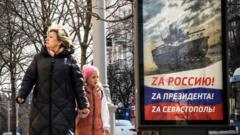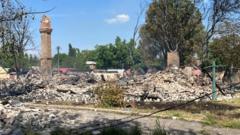Amidst the harsh realities of Russian occupation, women in Ukraine are bravely resisting attempts to ban their culture and traditions. This article highlights personal stories that shed light on the everyday struggles and clandestine resistance efforts taking place in occupied territories.
Voices from Occupied Ukraine: Women Share Their Struggles Against Russian Oppression

Voices from Occupied Ukraine: Women Share Their Struggles Against Russian Oppression
Women in Russian-occupied Ukraine are resisting repression and cultural erasure, sharing their narratives of bravery, fear, and the fight to maintain their identity.
In Russian-occupied regions of Ukraine, the voices of women like Maria (a pseudonym) resonate with sorrow and defiance as they wrestle with the erasure of their cultural identity. "Russians are trying to ban everything Ukrainian here: language, and also traditions. Even Ukrainian holidays are forbidden," Maria lamented, sharing her fears about the repressive atmosphere in territories under Moscow’s control.
As the U.S. leads peace negotiations, the plight of those living in occupied areas grows increasingly precarious. The Kremlin has implemented tight restrictions aimed at suppressing Ukrainian identity, introducing severe penalties for any dissent. With conversations about potential territorial concessions gaining traction, many Ukrainians fear losing their land. While Ukrainian officials vehemently deny plans to cede any territory, Russia aims to solidify its hold on regions such as Donetsk, Luhansk, Kherson, and Zaporizhzhia.
Living under constant fear, Maria is part of an all-female underground resistance movement committed to peaceful protest. They distribute leaflets and newsletters to preserve their culture and communicate the truth. "You have fear in your eyes, but your hands are still doing it. Of course it's scary," she articulated. The danger is palpable; the act of speaking openly, even to family members, carries the potential for dire consequences.
Sofia, who hails from an occupied village in Zaporizhzhia, recounted the risks taken by her parents, who were investigated by Russian authorities for supposedly providing information to the Ukrainian military. In her attempt to converse with them, she must navigate carefully, choosing her words wisely to avoid jeopardizing their safety. "It's getting really awkward living without Russian IDs," she noted, highlighting the difficulties imposed by refusing to acquiesce to the demand for Russian citizenship.
Women across occupied regions describe a palpable shift in their conversations with loved ones under occupation. Yeva reported her sister's reticence to discuss sensitive topics, suggesting a pervasive atmosphere of surveillance. The specter of punishment looms large, as Kateryna recounted the experience of an acquaintance detained for speaking with someone aiding the Ukrainian defense.
The Russian authorities' repressive measures include monitoring dissent through advanced surveillance systems, punishing activists for their opposition. Reports from Ukrainian rights organizations reveal that at least 121 activists, volunteers, and journalists have been killed since the onset of full-scale invasion, battling against a backdrop of fear and brutal crackdowns.
Despite these challenges, underground resistance networks persist. Groups such as the Zla Mavka movement focus on non-violent action, while others engage in acts of sabotage and espionage against occupying forces. Distributing Ukrainian symbols and documents, initiatives like the Yellow Ribbon movement strive to instill courage within their communities.
Propaganda permeates every aspect of life in occupied zones, with large-scale efforts to propagate a pro-Russian narrative reaching children in schools. Textbooks distort historical truths and glorify the Russian military presence, creating a skewed understanding of the conflict.
As the situation unfolds, the resilience and bravery of women like Maria underscore the importance of cultural identity in Ukraine’s fight against oppression amidst the complexities of war and negotiation.




















